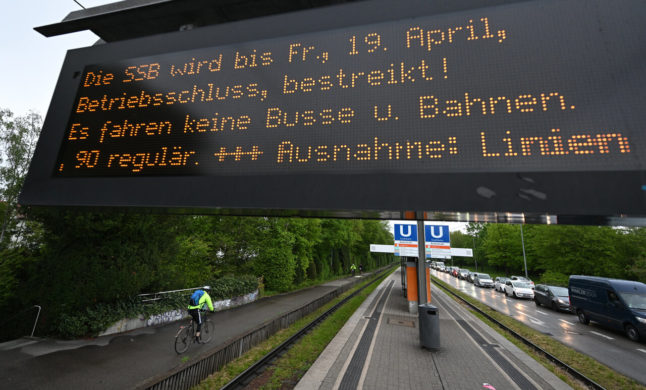It’s not a good week for those taking public transport in many parts of Germany, as various strikes have been called.
All day on Thursday and Friday, local public transport was set to come to a standstill in parts of Baden-Württemberg due to strikes amid collective bargaining negotiations for around 6,500 employees.
Trade union Verdi called for workers in seven cities to stage a ‘warning strike’ starting early on Thursday morning, resulting in a large number of buses, trains and Stadtbahn services being cancelled.
Local public transport companies in Stuttgart, Karlsruhe, Heilbronn, Freiburg, Baden-Baden, Esslingen and Constance are affected by the action.
But it’s not just southern Germany affected. Bus drivers with private operators are also on strike in Rhineland-Palatinate this week. The cities of Koblenz, Worms, Zweibrücken and Mainz are affected, as well as intercity traffic in many regions.
There is also a partial strike on local public transport in Saxony. Disruption is to be expected in Dresden, Zwickau and Chemnitz.
READ ALSO: Why Germany is being hit by strikes almost every day
What’s happening in Baden-Württemberg?
Verdi said it expected major disruption to local public transport on both Thursday and Friday as collective bargaining rounds continue.
More traffic was also expected on the roads due to the strikes. At rush-hour in Stuttgart, roads were more packed than usual.
The Stuttgarter Verkehrsbetriebe (VVS) said on its website that the “buses and light rail of SSB AG, as well as the buses of the SVE in Esslingen, are affected.
“S-Bahn, regional trains, secondary railway lines, buses in the network districts and replacement rail buses are not affected.”

In Freiburg there are no trams on both days and only a few buses running, such as lines 15 and 32.
There are no city buses or trams in Heilbronn. However, the regional bus service and the SWHN night service called “Buddy” are not affected.
From Thursday morning, city buses in Constance were also at a standstill and the car ferry to Meersburg was not running.
In Karlsruhe, AVG light rail services are not affected by the strike.
Many school leavers will have to look for alternatives. That’s because the strike coincides with the start of the end of school year examinations, known as Abitur in Germany.
Exams including biology, history and French are taking place on these two days.
Due to the industrial action, students in Baden-Württemberg are allowed to arrive up to 30 minutes late for Abitur exams, but there will be no cancellations.
READ ALSO: German public transport strikes taking place across Germany
What’s happening elsewhere in Germany?
Since Wednesday, very few buses have been running in districts in Saxony due to a strike called by Verdi, that’s due to end early on Sunday morning.
Those affected include local transport companies in Dresden, Görlitz, Meißen, the Regiobus Mittelsachsen GmbH, the regional transport Saxon Switzerland-Eastern Ore Mountains and Zwickau as well as in parts of the cities of Chemnitz (Euro Traffic Partner) and Plauen (Straßenbahn-Bus GmbH).
There is still no all-clear for the strike involving private bus companies in Rhineland-Palatinate. Anyone who relies on the bus here will have to look for alternatives this week. Verdi has called on all members who are employed by a private bus company under a collective agreement to go on strike for a week – and it doesn’t end until the early hours of Monday, April 22nd.
In Mainz, the strike affects the DB Regio Bus Mitte bus lines.
But it’s not just cities affected. Transport in many regions in Rhineland-Palatinate, such as the Westerwald, the Southern Palatinate and the Bernkastel-Wittlich district, is also at a standstill.
This comes amid a wave of strike action in Germany, which has been going on for months.
But in North Rhine-Westphalia, commuters can breathe a sigh of relief – at least for now. Verdi has agreed to arbitration proceedings to try and reach a decision in the collective bargaining negotiations. Strikes have been suspended for the time being since Wednesday.
Most recently, strikes in Düsseldorf, Essen, Bielefeld, Mönchengladbach, Krefeld and Bochum, among others, led to significant disruptions in public transport.



 Please whitelist us to continue reading.
Please whitelist us to continue reading.
Member comments